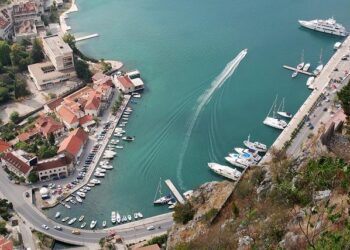Montenegro has taken a significant step towards deeper integration with the European financial system by officially launching its first SEPA (Single Euro Payments Area) transactions. This milestone, announced today, marks a crucial development in the country’s banking sector, promising faster, more efficient euro transfers across participating countries. As the latest addition to the SEPA network, Montenegro’s entry is expected to enhance cross-border trade and streamline payment processes for businesses and consumers alike.
Montenegro Integrates into European Payment Network with First SEPA Transactions
Montenegro marks a significant milestone in its financial evolution by executing its inaugural SEPA (Single Euro Payments Area) transactions. This leap enables Montenegrin banks and businesses to seamlessly process euro payments across Europe with enhanced speed and reduced costs. Financial institutions in the country have been adapting their infrastructure to comply with SEPA standards, focusing on streamlining cross-border euro transfers. This integration is expected to bolster trade relationships, enhance liquidity management, and provide Montenegrin consumers and enterprises with smoother, more transparent payment experiences.
Key benefits of SEPA implementation in Montenegro include:
- Faster processing times for euro transactions within the European market
- Lower fees for international payments across SEPA member countries
- Improved payment transparency and security protocols
- Greater accessibility for small and medium-sized enterprises (SMEs) in cross-border commerce
| Indicator | Pre-SEPA | Post-SEPA |
|---|---|---|
| Average Euro Transfer Time | 3-5 days | Same day or next day |
| Transaction Cost | Up to 1.5% | 0.1% – 0.3% |
| Number of Participating Banks | Limited | All major institutions |
Economic Impact of SEPA Adoption on Montenegro’s Banking Sector
The integration of SEPA has marked a significant milestone for Montenegro’s banking sector, positioning the country more firmly within the European financial ecosystem. By enabling smoother, faster, and cheaper euro transactions, banks in Montenegro are now able to offer services that rival those of their European counterparts. This enhancement in payment infrastructure is expected to attract new foreign investment, facilitate cross-border trade, and bolster customer confidence in the local banking system. Lower transaction costs and improved liquidity management will also empower smaller financial institutions to compete more effectively on a regional scale.
From an economic standpoint, SEPA adoption could stimulate several key growth areas, including:
- Increased efficiency in corporate cash flow management
- Expansion of e-commerce and digital banking services
- Strengthened ties with European financial markets
- Improved transparency and compliance with EU standards
| Indicator | Pre-SEPA | Post-SEPA | Change |
|---|---|---|---|
| Average Euro Transaction Time | 2-3 days | Within 24 hours | -85% |
| Cross-border Transaction Fees | 0.5%-1.5% | 0.05%-0.1% | -90% |
| Number of Banks Supporting Euro Transfers | 5 | 12 | +140% |
Recommendations for Businesses to Leverage New SEPA Payment Capabilities
Businesses operating in Montenegro now have a unique opportunity to streamline their payment processes and expand cross-border trade by integrating the new SEPA payment capabilities. Embracing these instant Euro transactions not only enhances operational efficiency but also reduces transaction costs and settlement times. To capitalize on this advancement, companies should prioritize updating their payment systems to support SEPA Credit Transfers and direct debits, ensuring compliance with pan-European standards and fostering stronger partnerships within the Single Euro Payments Area.
Adopting best practices such as:
- Educating finance teams about SEPA rules and security protocols to minimize risks.
- Communicating transparently with suppliers and clients about payment timelines and possible benefits.
- Leveraging automated reconciliation tools tailored for SEPA transactions to reduce manual errors.
- Exploring fintech integrations that can enhance payment tracking and reporting capabilities.
can place businesses at a competitive advantage in the evolving European financial ecosystem. Below is an overview comparing traditional and SEPA payment attributes relevant for Montenegrin enterprises:
| Feature | Traditional Payments | New SEPA Payments |
|---|---|---|
| Settlement Time | 1-3 Business Days | Within seconds |
| Currency | Multiple, exchange fees apply | Euro only, no exchange fees |
| Transaction Costs | Variable, often high | Standardized, generally lower |
| Geographical Scope | Limited to national borders | SEPA-wide coverage (36+ countries) |
The Conclusion
Montenegro’s initiation of SEPA transactions marks a significant milestone in the country’s financial integration with the European Union. By facilitating faster, more secure, and cost-effective euro transfers, this move is expected to enhance cross-border trade and investment opportunities. As Montenegro aligns its banking infrastructure with European standards, observers will be watching closely to see how this development impacts the nation’s economy and its broader ties within the region. ConnectingRegion.com will continue to monitor these advancements and provide updates on Montenegro’s evolving financial landscape.
















